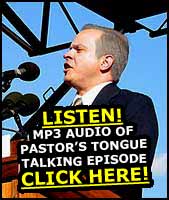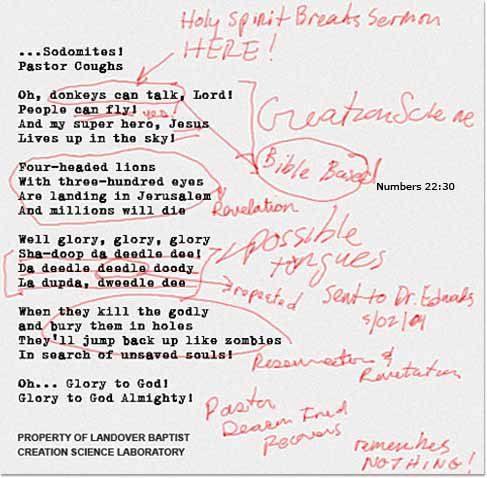By KARAN MINNIS, Guardian Staff Reporter
karan@nasguard.com
Although outlined by scripture and ordained as a gift by God, speaking in tongues, also known as "glossolalia," a now popular practice within the Christian community, is currently becoming so common that persons are wondering if the blessing truly exists.
This phenomenon, which can be traced to the days of the Apostles, was once usually encountered in Pentecostal Churches, revival meetings, Quaker gatherings and some Methodist groups. However, today, glossolalia is also found in some Roman Catholic and Protestant Churches, and can be considered one of the most talked about phenomenas in Christianity as many people around the world are developing their "given gifts."
And according to Archdeacon Keith Cartwright of St Christopher's Anglican Church in Lyford Cay, the gift of speaking in tongues is a true gift from God that should not be abused or misused.
Explaining that those who receive the gift will always have an interpreter, Archdeacon Cartwright said that "it's no use speaking in tongues if there is not an interpreter, who will be able to translate and repeat what the person is saying.
"The other thing that is most important is that we must emphasize that speaking in tongues is a gift and not everyone has that gift. In fact most people don't. And so what we have to do is, recognize that most people who are believers, those people who practice their Christianity, aren't able to speak in tongues. However, that doesn't mean they don't have any other spiritual gifts."
The Anglican priest said that he has found that some people that do have the gift, have an attitude that it is special, and assume that others are not as special as they are. But he said that they shouldn't.
"People must realize that speaking in tongues is not any more special of a gift than someone who can organize the keeping of the church's yard, or someone who can arrange flowers in the church," the archdeacon said. "Everybody is given certain gifts and that's what I really want people to understand."
In the New Testament, the book of Acts recounts how "tongues of fire" descended upon the heads of the Apostles, accompanied by the miraculous occurrence of speaking in languages unknown to them, but recognizable to others present as their own native language. This phenomenon is variously interpreted either as religious xenoglossia, the speaking of an actual foreign language, or as the gift of interpretation being given to those present: the ability to understand the tongues, each person in his own language.
Some of the Orthodox hymns sung at the Feast of Pentecost, which commemorates this event in Acts, describe it as a reversal of what happened at the Tower of Babel as described in Genesis 11. In other words, the languages of humanity were differentiated at the Tower of Babel leading to confusion, but were reunited at Pentecost, resulting in the immediate proclamation of the Gospel to people who were gathered in Jerusalem from many different countries.
Also in the New Testament some scholars say Paul describes the experience as speaking in an "unknown tongue." Some also say that there are many who believe that all believers have the ability to speak in tongues (Mark 16:16-17) as a form of prayer, based on 1 Corinthians 14:14, Eph 6:18 and Jude 20. However, while occurrences of glossolalia are widespread and well documented, there is considerable debate within religious communities, principally Christian, as to both its status and the extent to which glossolalic utterances can be considered to form language. People are also said to debate its source, in terms of whether glossolalia is a natural, supernatural, or spiritual phenomenon.
According to Rev. Ulric Smith of Zion Baptist Church Shirley Street, the Baptist faith believes in every gift that the Bible declares.
"For us, speaking in tongues is listed as one of the gifts that we recognize," he said. "When I say we, I mean our brand of Baptist.
"Baptist can be found in varying contexts, as they may vary on certain matters of dogma, but not the essentials of Christianity. For example the worship expressions may vary. However, for us, we are not at grievance with speaking in tongues, as we view it as an operation for the Holy Spirit."
Highlighting 1 Cor. 12, Rev. Smith said that when used in corporate worship glossolalia is suppose to be edifying.
The Baptist minister puts it this way: "If it is something that is voiced in such as way that it is drawing the attention of the entire community of faith, not just used by people in their personal prayer, I am referring to if it is done in a way that is calling the entire community of faith, then they will be accompanied by an interrupter to edify."
Stating that this gift has been expressed throughout his church amongst leadership and membership, Rev Smith said that there have been some persons who have been turned off by the gift because of the way it is exercised.
"However, I have found that there is nothing wrong with the gift, but the problem may be in the person's way of exercising the gift that may be the problem," he said.
It is said that some Christians practice glossolalia as a part of their private devotions and that some sections of Christianity also accept and sometimes promote the use of glossolalia within corporate worship. This is particularly true within the Pentecostal and Charismatic traditions, as both Pentecostals and Charismatics believe that the ability to speak in tongues, and sometimes the utterance itself, is a supernatural gift from God.
Adding that the gift of tongues is available to all believers, Apostle Lee Watson of Trinity Assembly 'City of Praise,' said that the gift is just what it is, a "gift."
"According to the scripture, all those who received baptism in the Holy Spirit they spoke with other tongue, with the Spirit of the apostle," she said. "And so we believe that everyone can be blessed with the gift, however, not everyone is. It is a gift and Jesus is the distributor, so everybody can be blessed with such a gift. He [Jesus] says that in the last days I will pour my spirit upon all flesh, and so the gift of the Holy Spirit is for everybody."
Calling it a doorway to receiving the other eight gifts of the Holy Spirit, which are wisdom, knowledge, faith, gifts of healing, working of miracles, prophecy, discerning of spirits, and the interpretation of tongues, Apostle Lee said that when a person is filled with the Holy Ghost they will speak with God and speak in tongues.
Acknowledging that there are some who do not believe in the gift, she said, "I'm not going to argue with them, but if they receive him [Jesus], if they receive the gift of tongues they will see."
It is said that Christians who practice glossolalia typically describe their experience as a regular and even mundane aspect of private prayer that tends to be associated with calm and pleasant emotions. However, this is in contrast to the perception of glossolalia amongst Christians who witness but do not practice glossolalia, and those who have no experience of glossolalia at all.



